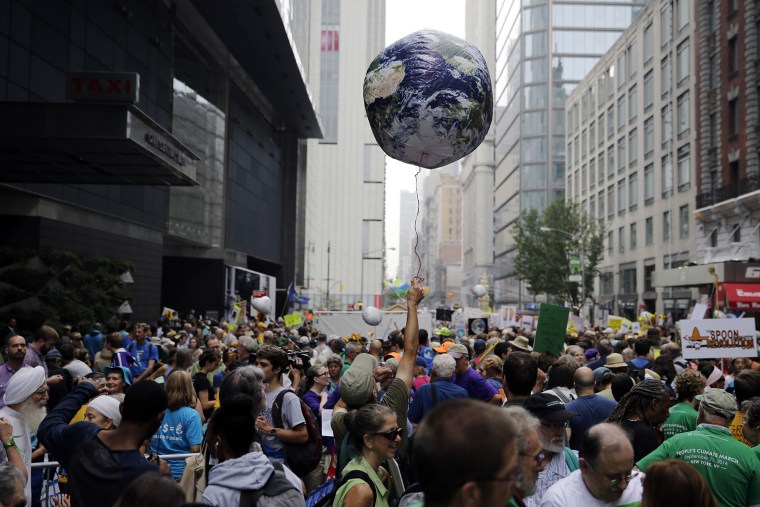It was just a few years ago that even modest gatherings of Tea Party activists were considered important political news. With that in mind, when over 300,000 activists march together to demand action on the climate crisis, it deserves to be considered a big deal.
MSNBC's Ned Resnikoff and Amanda Sakuma
reported yesterday from what organizers described as "the largest mobilization against climate change in the history of the planet."
Hundreds of thousands of demonstrators of all ages and from around the world turned out for the massive People's Climate March Sunday, filling the streets of midtown Manhattan with demands for global leaders take action to avert catastrophic climate change. Crowds gathered with banners, flags and floats around Columbus Circle late Sunday morning as music and chants rang out at the start of the march. At exactly 12:58 p.m., demonstrators held a moment of silence in honor of the victims of climate change, followed by a cacophony of noise with drums, cheers and horns to sound the alarm to the crisis.
Though local law enforcement did not release an official estimate on the crowd size, event organizers said the march drew more than 300,000 demonstrators.
The gathering coincided with new data from the Global Carbon Project, published in the journal Nature Geoscience, that emissions jumped in 2013 to record levels, including a 2.9% increase in the United States, despite modest declines in recent years. The
New York Times' report on the new figures noted that if global temperatures "continue on their present course through the century, scientists say, the earth could warm by as much as 10 degrees Fahrenheit above the preindustrial level, which would likely be incompatible with human civilization in its current form."
But yesterday's march, timed to coincide with the start of a United Nations climate change summit in New York City, was not the only evidence of a societal shift. The Rockefeller Brothers Fund will announce this morning that it's
joining the fossil-fuel divestment movement.
That's no small development -- the Rockefeller Brothers Fund was created in part by wealth generated by John D. Rockefeller and Standard Oil.
Meanwhile, in the nation's capital, Shaun Donavon delivered his first public remarks as the White House budget director on Friday. As Lori Montgomery
reported, the new OMB chief skipped over the Beltway's preoccupation with the deficit and debt, focusing instead on the consequences of global warming.
"From where I sit, climate action is a must do; climate inaction is a can't do; and climate denial scores -- and I don't mean scoring points on the board. I mean that it scores in the budget. Climate denial will cost us billions of dollars," Donovan said before a friendly crowd at the liberal Center for American Progress. "The failure to invest in climate solutions and climate preparedness doesn't get you membership in a Fiscal Conservatives' Caucus -- it makes you a member of the Flat Earth Society," Donovan continued. "The costs of climate change add up and ignoring the problem only makes it worse."
We tend to think of the climate crisis in the context of unfolding environmental disasters. There are also serious national security implications to consider.
But less appreciated are the looming fiscal consequences. Derek Bok once said, "If you think education is expensive, try ignorance," and that seems especially true when it comes to global warming.
Katie Valentine's
report on Donovan's remarks highlighted the costs of responding to extreme weather events, and top of the costs associated with wildfires and droughts.
In recent years, it's become quite common for the "Very Serious People" in Washington to call for cuts to social-insurance programs and the safety net in the name of long-term "fiscal responsibility." I'll look forward to the day when these same fiscal scolds demand climate action with equal vigor.
